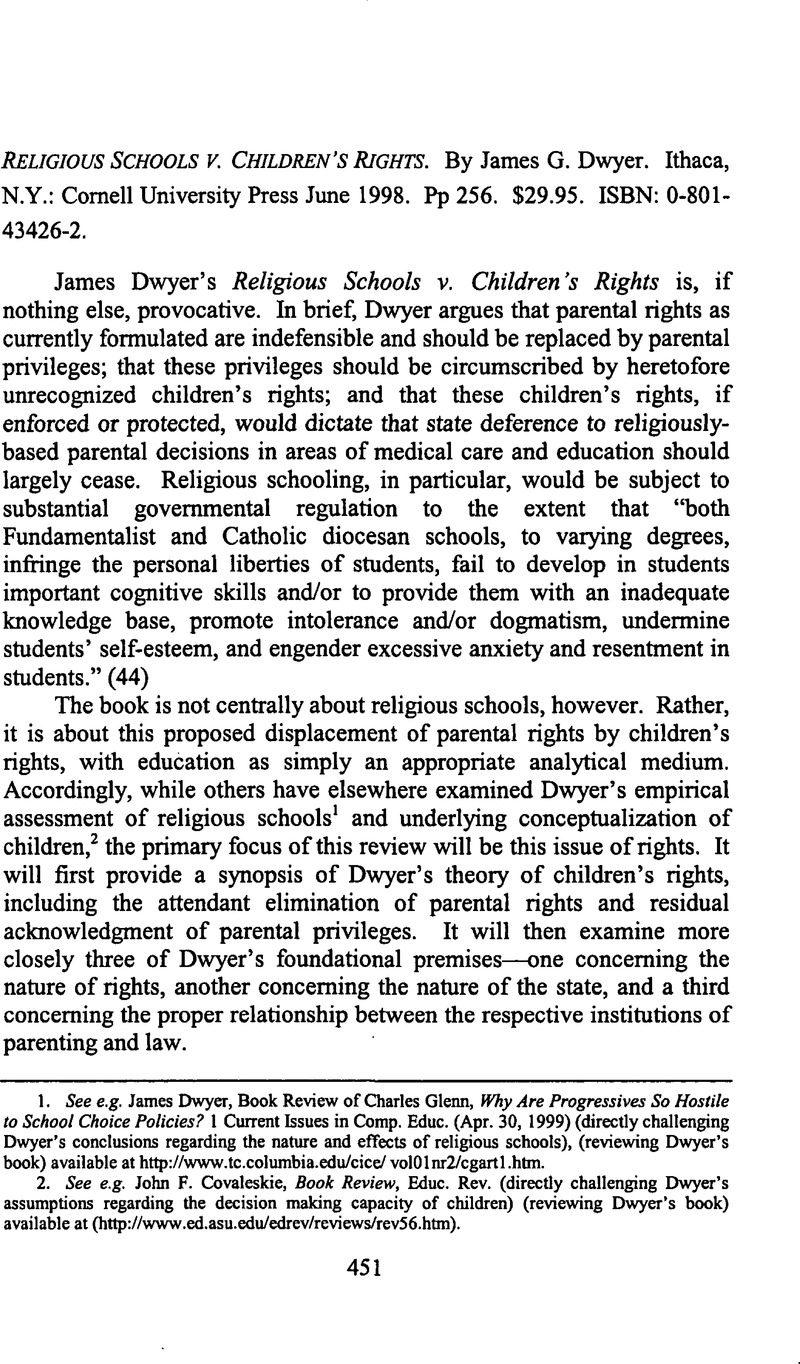No CrossRef data available.
Article contents
Religious Schools V. Children's Rights. By James G. Dwyer. Ithaca, N.Y.: Cornell University Press061998. Pp 256. $29.95. ISBN: 0-801-43426-2.
Published online by Cambridge University Press: 24 April 2015
Abstract

- Type
- Review Essays and Reviews
- Information
- Copyright
- Copyright © Center for the Study of Law and Religion at Emory University 2001
References
1. See e.g. James Dwyer, Book Review of Glenn, Charles, Why Are Progressives So Hostile to School Choice Policies? 1 Current Issues in Comp. Educ. (04 30, 1999)Google Scholar (directly challenging Dwyer's conclusions regarding the nature and effects of religious schools), (reviewing Dwyer's book) available at http://www.tc.columbia.edu/cice/vo101nr2/cgartl.htm.
2. See e.g. John F. Covaleskie, Book Review, Educ. Rev. (directly challenging Dwyer's assumptions regarding the decision making capacity of children) (reviewing Dwyer's book) available at (http://www.ed.asu.edu/edrev/reviews/rev56.htm).
3. (emphasis added). See (1) (“[T]he Supreme Court … created for parents a constitutional right to send their children to a private school of their choosing, and to resist state-imposed restrictions on instruction in their children's schools.”) (emphasis added); (45) (“It is the state that confers on parents rights to control certain child-rearing matters …”); (84) “Ordinarily we assign rights to the person who needs protection, whose interests are at stake.” (emphasis added).
4. See Farrington v. Tokushige, 273 U.S. 284, 298, 299 (1927); Pierce v. Soc'y of Sisters of Holy Names of Jesus & Mary, 268 U.S. 510, 535 (1925); Meyer v. Neb., 262 U.S. 390, 399 (1923).
5. Feldmeier, John P., Note, U.S. v. Vergugo-Urquidez: Constitutional Alchemy of the Fourth Amend., 20 Cap. U. L. Rev. 521, 534 (1991)Google Scholar.
6. There is some later discussion of parental religious interests. See (137) (but it is fairly incidental and ultimately dismissive).
7. See ( 60) (“Some religious groups … claim that prayer is more likely than medical care to cure a child because the child will get well only if it is God's will, but that is neither an argument about the best medical care nor an argument that the state can accept as true or even reasonable.”); 143 (“[T]he state may not assume that children have …[a need to grow up within a religious belief system] …; to do so the state would have to assume the truth of particular religious beliefs which … the Establishment Clause prohibits it from doing.”).
8. See e.g. Idleman, Scott C., The Sacred, the Profane, and the Instrumental: Valuing Religion in the Culture of Disbelief, 142 U. Pa. L. Rev. 1313, 1377–1378 n. 220 (1994)CrossRefGoogle Scholar (book review).
9. Compare generally Bd. of Educ. of Kiryas Joel Village Sch. Dist. v. Grumet, 512 U.S. 687, 702-705 (1994).
10. Church of the Lukumi Babalu Aye, Inc. v. City of Hialeah, 508 U.S. 520, 577 (1993) (Souter, J., concurring in part and concurring in the judgment).
11. For a more comprehensive Establishment Clause analysis of the arguments and issues raised in Dwyer's book, see Gilles, Stephen G., Hey, Christians, Leave Your Kids Alone!, 16 Const. Comm. 149, 185–198 (1999)Google Scholar (reviewing Dwyer's book).
12. See e.g. Church, Catholic, Catechism of the Catholic Church ¶¶ 2221–2230 (Paulist Press 1994)Google Scholar; Symposium on Religious Law: Roman Catholic, Islamic, and Jewish Treatment of Familial Issues, 16 Loy. L.A. Intl. & Comp. L.J. 9, 12–34 (1993)Google Scholar (discussing various religious doctrines on parental educational obligations); In re S.L. & L.L., 419 NW2d 689, 694 (S.D. 1988) (Henderson, J., dissenting).
13. Jack Lewis, Inc. v. Mayor & City Council of Baltimore, 164 A. 220, 223 (Md. 1933), appeal dismissed, 290 U.S. 585 (1933)). See Fuchs v. Goe, 163 P.2d 783, 798 Iwyo. 1945); In re Estate of Force, 42 A.2d 302, 303 (N.J. Essex County Orphans Ct. 1945); Hodges v. Charlotte, 200 SE 889, 892 (N.C. 1939); State ex rel. Funke v. Lancaster, 194 N.W. 807, 810 (Neb. 1923).


